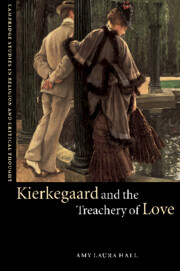Book contents
- Frontmatter
- Contents
- List of abbreviations
- Preface
- Introduction
- 1 The call to confession in Kierkegaard's Works of Love
- 2 Provoking the question: deceiving ourselves in Fear and Trembling
- 3 The poet, the vampire, and the girl in Repetition with Works of Love
- 4 The married man as master thief in Either/Or
- 5 Seclusion and disclosure in Stages on Life's Way
- 6 On the way
- Notes
- Works cited
- Index
Introduction
Published online by Cambridge University Press: 22 September 2009
- Frontmatter
- Contents
- List of abbreviations
- Preface
- Introduction
- 1 The call to confession in Kierkegaard's Works of Love
- 2 Provoking the question: deceiving ourselves in Fear and Trembling
- 3 The poet, the vampire, and the girl in Repetition with Works of Love
- 4 The married man as master thief in Either/Or
- 5 Seclusion and disclosure in Stages on Life's Way
- 6 On the way
- Notes
- Works cited
- Index
Summary
In his otherwise disparaging essay on Kierkegaard's poetics, George Lukács notes: “he saw more clearly than any other the thousand aspects, the thousand-fold variability of every motive [and] how, if we look really close, we can see an unbridgeable abyss gaping between two barely perceptible nuances.” This comment well characterizes one of Kierkegaard's most compelling rhetorical strategies. The reader who enters a text supposing himself to have a respectable grasp on reality and its principles finds himself dizzied by the numerous, previously imperceptible, possibilities for error. In Works of Love Kierkegaard brings this tactic to bear on our intimate engagements, pressing the reader to inspect the vast “variability of every motive” and to discover the “unbridgeable abyss gaping” between what we think to be love and what love truly is. If appropriately taken by the text, we peer inward at the multiple, often dubious motives propelling our own engagements, confess with dismay the irreparable fracture running through our love, and seek redemption.
Kierkegaard's aim and his form are offensive, his rather unlovely tone unremitting. As Karl Barth protests regarding Works of Love, merely human love is “tracked down to its last hiding-place, examined, shown to be worthless and haled before the judge!” This complaint, by a theologian indebted to Kierkegaard, has been magnified and repeated, in various ways, by subsequent interpreters. The response is understandable.
- Type
- Chapter
- Information
- Kierkegaard and the Treachery of Love , pp. 1 - 10Publisher: Cambridge University PressPrint publication year: 2002
- 1
- Cited by

